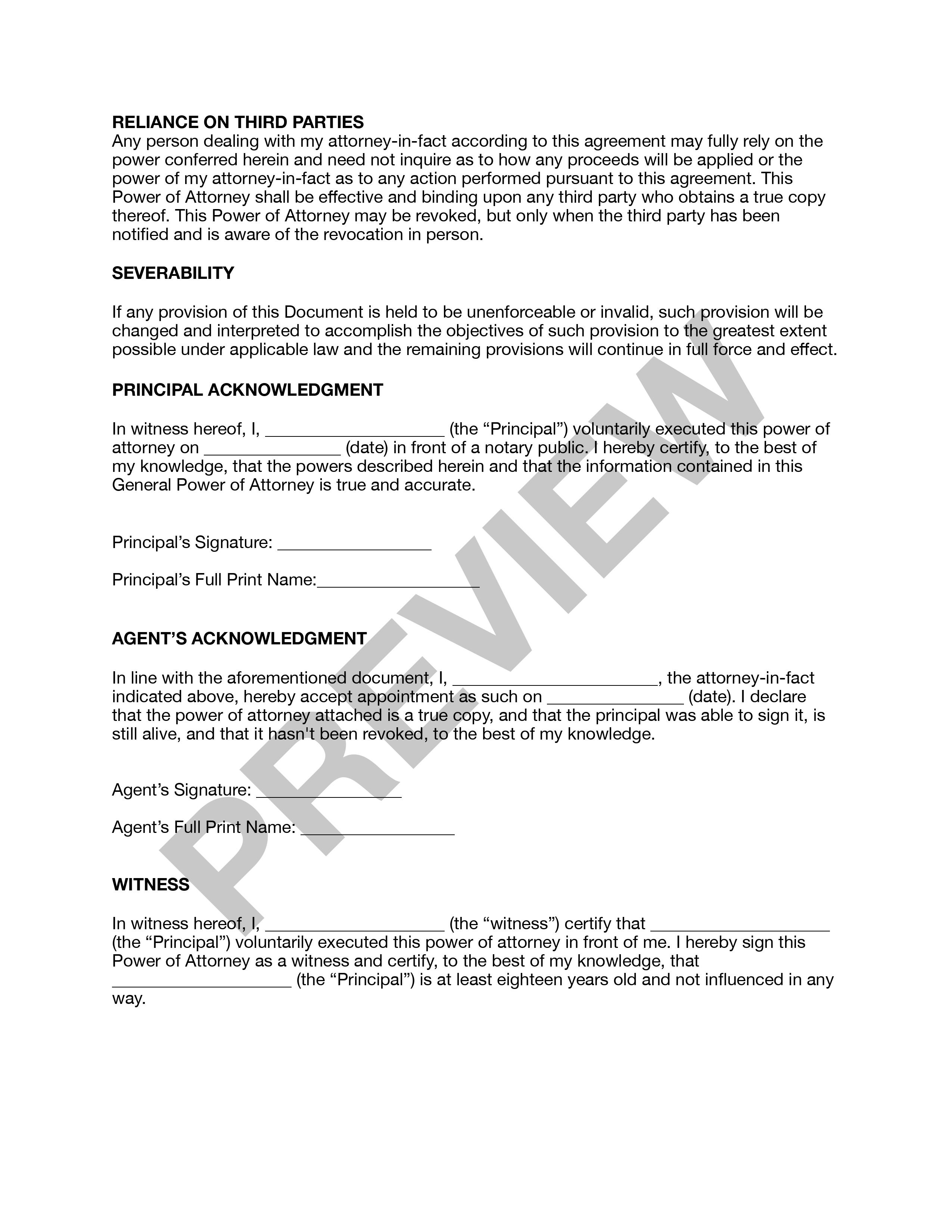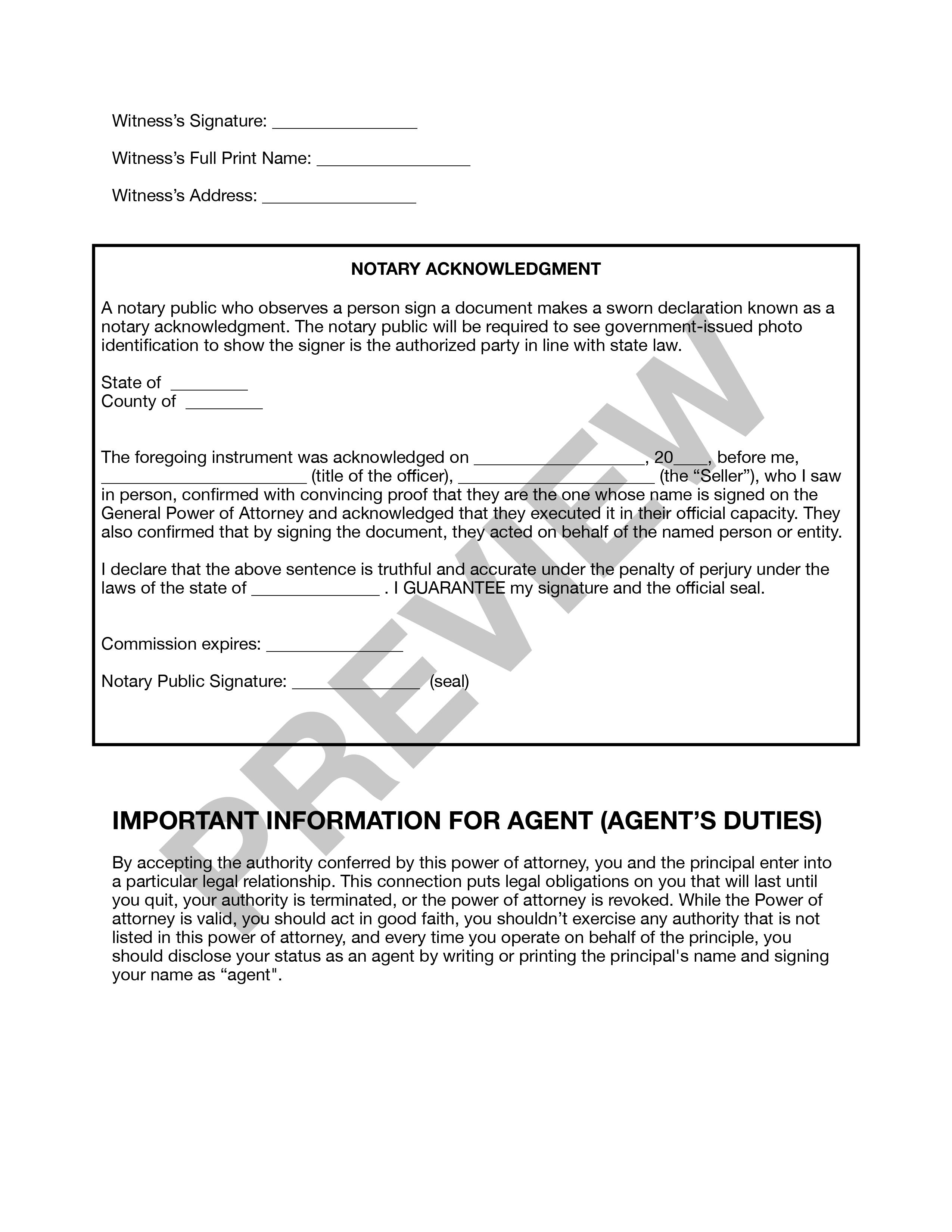Generate Power of Attorney
Power of attorney is legal authority granted to a person to act on behalf of another in making financial and legal decisions.
What type of POA do you need?
Select the Power of Attorney.Last Updated February 2023
What is a Power of Attorney?
A Power of Attorney (POA) is a legal document that allows one person (the "principal") to appoint another person (the "agent" or "attorney-in-fact") to act on their behalf.
The agent can be authorized to manage the principal's financial, legal, or personal affairs, depending on the scope of the POA. This can include tasks such as paying bills, managing investments, buying or selling property, making healthcare decisions, and more.
There are different types of POAs, including general, limited, durable, and springing. A general POA gives the agent broad authority to act on the principal's behalf, while a limited POA only allows the agent to perform specific tasks or for a limited period of time. A durable POA remains in effect even if the principal becomes incapacitated, while a springing POA only takes effect when a specific condition is met, such as the principal becoming incapacitated.
A POA can be useful in situations where the principal is unable to act on their own behalf due to illness, injury, or absence. It can also be helpful in estate planning, allowing the principal to appoint someone they trust to manage their affairs in the event they become unable to do so themselves.
Who should you Choose as your Agent?
You might choose to appoint a member of your family to represent you. Numerous individuals choose their partners or one or more children. When appointing more than one person to serve as an agent concurrently, keep in mind that not all of them might be available to act when necessary or they might not all agree. Choosing co-agents should reflect your preference for having the majority act in the absence of complete availability and consent. Whether or not you choose co-agents, you should nevertheless designate one or more successor agents to cover the eventuality that the person you designate as agent could be unable to act when the time comes.
To function as an attorney-in-fact, no specific requirements must be met, with the exception that the individual cannot be a juvenile or otherwise handicapped. The ideal option is a person you can trust. The most crucial quality of a potential agent is frequently integrity, not financial knowledge.
What if you are chosen as an Agent?
If you're ever required to serve as someone else's agent, you should speak with a lawyer to determine what you can and cannot do as well as any necessary safety measures to reduce the possibility that someone may challenge your conduct. If you do acts that directly or indirectly benefit you personally, this is very crucial.
What Powers should I grant my Agent?
Your attorney-in-fact can take actions to carry out your estate plan in addition to handling your day-to-day financial concerns. Although an agent cannot change your will on your behalf, in some states and jurisdictions, an attorney-in-fact is allowed to establish or alter trusts on your behalf while you are still alive or transfer assets to trusts you have established. An agent can influence the result of how your assets are dispersed even without altering your will or establishing trusts by changing the ownership (title) of assets. It is advisable to specify whether you want your agent to have certain rights in the power of attorney.
Many estate plans include gifts as a key tool, and your attorney-in-fact may use gifts on your behalf as long as they adhere to the parameters you specify in your power of attorney.
How many different types of Power of Attorney exist?
There are several types of power of attorney (POA), each with different powers and legal requirements. Here are some of the most common types of power of attorney:
-
General Power of Attorney: A general power of attorney gives the agent broad authority to act on the principal's behalf in various matters, such as financial, legal, and personal affairs.
-
Durable Power of Attorney: A durable power of attorney remains in effect even if the principal becomes incapacitated or unable to make their own decisions. This means that the agent can continue to act on the principal's behalf in such situations.
-
Limited Power of Attorney: A limited power of attorney gives the agent the authority to act on the principal's behalf for specific tasks or a limited period of time. For example, a limited power of attorney may be used for a real estate transaction or to sign a contract on the principal's behalf.
-
Springing Power of Attorney: A springing power of attorney only takes effect when a specific condition is met, such as the principal becoming incapacitated. This means that the agent's authority only begins when the specified condition occurs.
-
Medical Power of Attorney: A medical power of attorney, also known as a healthcare power of attorney or healthcare proxy, gives the agent the authority to make healthcare decisions on the principal's behalf if the principal becomes unable to make those decisions themselves.
-
Financial Power of Attorney: Financial Power of Attorney: A financial power of attorney gives the agent the authority to manage the principal's financial affairs, such as paying bills, managing investments, and filing taxes.
Frequently Asked Questions
A power of attorney that is in effect when you sign it will often continue to be so even if your state of residency changes. Even while moving to a new state alone shouldn't need the signing of a new power of attorney, it is a good idea to use the chance to update your power of attorney. In order to ensure that the subtleties of the new state legislation (and any other changes in circumstances that have transpired since your old agreements were signed) are handled, the update should preferably be included in a review and update of your entire estate plan.
A durable power of attorney (DPOA) is a type of power of attorney that remains in effect even if the principal becomes incapacitated or unable to make their own decisions.
Unlike a regular power of attorney, which becomes void if the principal becomes incapacitated, a durable power of attorney allows the agent (or "attorney-in-fact") to continue to act on the principal's behalf in such situations.
A durable power of attorney can be used for financial or medical decision-making, depending on the specific purpose for which it is created. For example, a durable financial power of attorney would allow the agent to manage the principal's finances if the principal becomes incapacitated or unable to make financial decisions on their own. Similarly, a durable medical power of attorney would allow the agent to make healthcare decisions on the principal's behalf if the principal becomes unable to make those decisions themselves.
There are several benefits to having a power of attorney (POA). Some of the key benefits include:
- Ensuring continuity of decision-making: A POA enables the principal to choose someone they trust to make decisions on their behalf if they become incapacitated or otherwise unable to make decisions themselves. This can help ensure that important decisions are made in a timely and appropriate manner, even if the principal is unable to participate in the decision-making process.
- Simplifying financial management: A financial POA can give the agent the authority to manage the principal's financial affairs, pay bills, and make other financial decisions. This can help simplify financial management, particularly for older adults or individuals with complex financial situations.
- Facilitating medical decision-making: A healthcare POA can give the agent the authority to make medical decisions on behalf of the principal if they are unable to do so. This can help ensure that the principal's medical wishes are followed and that appropriate medical care is provided.
- Providing peace of mind: By appointing a trusted agent to act on their behalf, the principal can have peace of mind knowing that their affairs will be managed by someone they trust, even if they are unable to manage them themselves.
Overall, a power of attorney can be a valuable tool for individuals who want to ensure that their affairs are managed according to their wishes, even if they are unable to make decisions themselves.
The expiration of a power of attorney (POA) depends on the type of POA and any specific terms outlined in the document. Here are some general guidelines:
- General and limited POA: These types of POAs may include an expiration date, a specific event or condition that terminates the POA, or a provision that allows the principal to revoke the POA at any time. If there is no expiration date or termination event, the POA remains in effect until the principal revokes it or becomes incapacitated.
- Durable POA: A durable POA typically does not expire unless the principal revokes it or a court terminates the agent's authority. This means that the agent will continue to have the authority granted by the POA even if the principal becomes incapacitated.
- Springing POA: A springing POA becomes effective only when a specified event or condition occurs, such as the principal becoming incapacitated. Once the triggering event occurs, the POA remains in effect until the principal revokes it or the event or condition that triggered the POA is no longer present.
It is important to review the specific terms of your POA to understand when it may expire, as well as any other details or limitations that may affect its validity and enforceability. If you are unsure or have any questions, it is recommended to consult with an attorney.
If an agent abuses their authority, it can be a serious breach of trust and can have legal consequences. Some possible outcomes include:
- Revocation of the POA: The principal or a court can revoke the power of attorney if the agent is found to be acting improperly or abusing their authority.
- Legal action: The principal or other interested parties may be able to take legal action against the agent for any harm caused as a result of their actions. This may include civil lawsuits or criminal charges.
- Financial restitution: If the agent has misused funds or assets, they may be required to reimburse the principal or their estate for any losses or damages incurred.
- Removal of the agent: A court may remove the agent and appoint a new agent to act on behalf of the principal.
It is important to note that the specific actions that can be taken in response to agent abuse may vary depending on the laws of the jurisdiction and the specific circumstances of the case. If you suspect that an agent is abusing their authority, it is recommended to seek legal advice as soon as possible. Additionally, taking steps to carefully select a trustworthy and competent agent and clearly defining their powers and responsibilities in the power of attorney document can help prevent abuse of authority.






